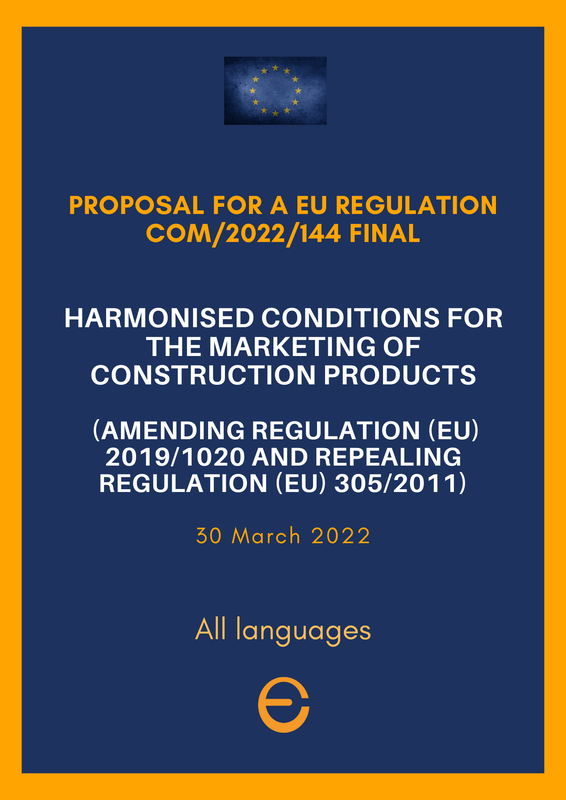|
Brussels, |
|
Constructions
Review of the Regulation
|
The European Commission's Proposal on the revision of the Construction Product Regulation (CPR) was adopted on 30 March 2022. This followed the publication of the July 2016 implementation report and the November 2016 announcement in the communication 'clean energy for all Europeans' about a potential revision of the CPR. The revision process was confirmed by the European Green Deal in December 2019 and the Circular Economy Action Plan in March 2020.
Evaluation and Impact Assessment The Commission conducted an evaluation and an impact assessment starting in 2016. Due to its complexity, these processes were decoupled, with the evaluation published in October 2019. The evaluation involved various steps, including roadmap updates, stakeholder consultations, and dialogues on pertinent issues such as standardization and simplification for SMEs. Several reports and studies supported this process, providing evidence for both the evaluation of the CPR and the impact assessment of potential future options. |
Public Consultation and Stakeholder Dialogue
The Commission conducted public consultations between January and April 2018 to gather stakeholders' experiences and opinions. Additionally, dialogues with main stakeholders were held on issues like standardization, simplification for SMEs, and the future of the European Organisation for Technical Assessment (EOTA). Key reports included:
The Revised Proposal
The revised roadmap for the CPR included feedback from stakeholders and outlined indicative options for the future. Dedicated question and answer sessions and a technical stakeholders’ conference in 2020 facilitated further discussions. A second public consultation focused on the impacts of potential future options, with results expected soon.
The Integration of Digital Passport for Construction Materials
A key element of the revised CPR proposal is the introduction of a digital passport for construction materials. This innovative approach aligns with the EU's commitment to digitalization and the circular economy. The digital passport aims to streamline information on construction materials, enhancing transparency, and efficiency.
Outcome and Next Steps
The revision process involves assessing impacts and formulating a new proposal based on collected evidence and stakeholder input. The timeline is provisional, and further developments are anticipated as the Commission processes the results of recent consultations and discussions.
This comprehensive revision of the CPR is a critical step towards enhancing the efficiency, sustainability, and competitiveness of the EU construction sector, with the digital passport for construction materials being a notable innovation in this direction.
On 13 December 2023, the Council and the European Parliament reached a provisional agreement on the revision of the Construction Products Regulation (CPR), that will speed up the green and digital transitions in the building sector. The provisional agreement takes into account the development of technologies, provides for the creation of a construction products digital passport and sets out the empowerment for future procedures for green public procurement of construction products.
The Commission conducted public consultations between January and April 2018 to gather stakeholders' experiences and opinions. Additionally, dialogues with main stakeholders were held on issues like standardization, simplification for SMEs, and the future of the European Organisation for Technical Assessment (EOTA). Key reports included:
- Support for the CPR evaluation (September 2018): Final report, annexes, and executive summary.
- Support for the impact assessment (September 2018): Final report, annexes, and executive summary.
- Evaluation report and executive summary published on 24 October 2019.
- Report on EOTA published on 24 October 2019.
The Revised Proposal
The revised roadmap for the CPR included feedback from stakeholders and outlined indicative options for the future. Dedicated question and answer sessions and a technical stakeholders’ conference in 2020 facilitated further discussions. A second public consultation focused on the impacts of potential future options, with results expected soon.
The Integration of Digital Passport for Construction Materials
A key element of the revised CPR proposal is the introduction of a digital passport for construction materials. This innovative approach aligns with the EU's commitment to digitalization and the circular economy. The digital passport aims to streamline information on construction materials, enhancing transparency, and efficiency.
Outcome and Next Steps
The revision process involves assessing impacts and formulating a new proposal based on collected evidence and stakeholder input. The timeline is provisional, and further developments are anticipated as the Commission processes the results of recent consultations and discussions.
This comprehensive revision of the CPR is a critical step towards enhancing the efficiency, sustainability, and competitiveness of the EU construction sector, with the digital passport for construction materials being a notable innovation in this direction.
On 13 December 2023, the Council and the European Parliament reached a provisional agreement on the revision of the Construction Products Regulation (CPR), that will speed up the green and digital transitions in the building sector. The provisional agreement takes into account the development of technologies, provides for the creation of a construction products digital passport and sets out the empowerment for future procedures for green public procurement of construction products.


